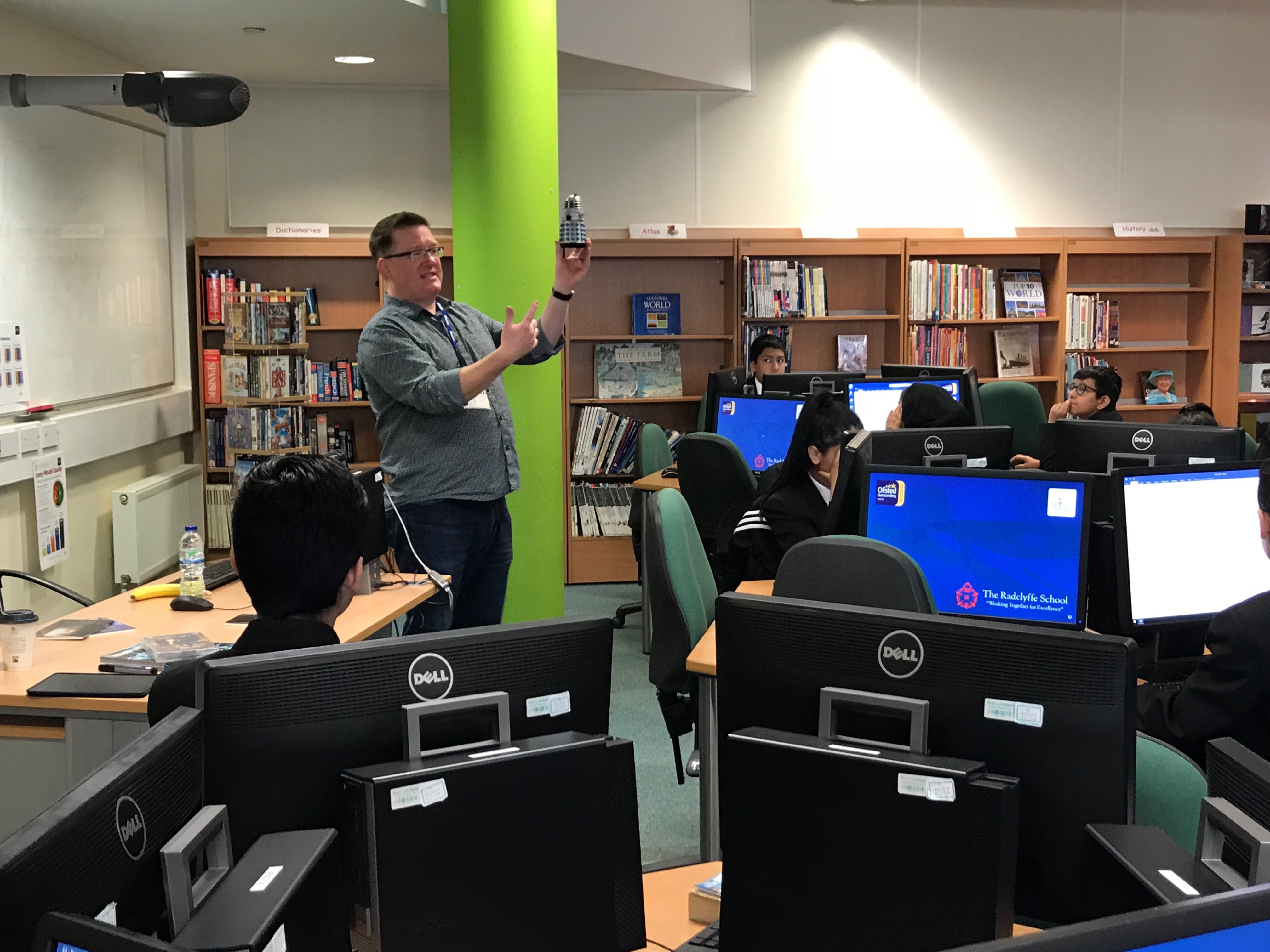The Doctor will be with you shortly…

Author and Radclyffe School writer-in-residence Mark Wright talks to Kathleen Roberts about how Doctor Who can be used to inspire pupils’ creativity.
Doctor Who fans await the latest regeneration of Earth’s favourite Time Lord with bated breath. Not just because the glass ceiling in the TARDIS is finally broken and we have the first female Doctor. But because Doctor Who has inspired generations of children to dream of travelling through time and space… and still does.
No-one knows this better than author and school writer-in-residence Mark Wright.
As a ten-year-old, Mark was obsessed with Doctor Who and imagined having adventures that took him away from his home in Northern England, in company with the Doctor.
“I learned to read and write creatively from the Doctor Who novels that were adapted from the television series by Target Books,” Mark recollects. “I read them all voraciously and started writing my own stories. Just watching the series on TV wasn’t enough – it inspired me to go on journeys in my own imagination – and that’s what children everywhere love to do.”
As part of his residency at the Radclyffe School near Oldham and as a regular visitor to primary schools, he certainly encourages the children’s imaginations to run riot. Though a day in school can be pretty exhausting, as he combines small groups and classes with assemblies and any activities that teachers are keen to involve him in.
Who Experts
Mark knows more about the Doctor than – well, even the Doctor. The TV series is the tip of a very large iceberg for Doctor Who fans, as they are desperate to know about the character’s many other adventures when not on screen. The series may have been running since 1963, but the appetite for information about the Time Lord from Gallifrey will apparently never be sated.
Enter Mark and his colleagues – there is nothing about the various lives of the Doctor and those companions that he doesn’t know. The co-author (with fellow Who expert Cavan Scott) of ‘Who-ology: The Official Miscellany’, he has also written novels, comic books, Doctor Who Magazine pieces and scripted audio books as well. He also co-edits the ongoing part-work, Doctor Who – The Complete History.
Mark took his ‘A’-levels at Calderdale College in Halifax – strangely enough, just up the road from Huddersfield, where new Doctor Jodie Whittaker was a student. She is the first Time Lord to go to an FE college (she subsequently studied at the Guildhall School of Music and Drama) and the first to hail from Yorkshire – as well as Gallifrey.
More than just the Doctor
Mark’s output isn’t exclusively about Doctor Who, as he’s written many other works, some of which are also inspired by TV series (like Blake’s Seven and The Tomorrow People) whilst others involve characters of his own. But Doctor Who stories continue to feature in his life.
“I still adore it – but now it’s my living. So I have to watch it anyway – which is no bad thing!” he remarks happily.
Following Mark’s workshops, teachers can use extracts from programmes like Doctor Who to build on the work he has done. This can extend beyond creative writing and include cross-curricular learning opportunities in history, geography, computer skills, PSHE and other areas.
For example, he has used the Doctor Who theme music to inspire pupils to explore their emotional reactions, using vocabulary to describe their feelings and the images inspired by the music. He demonstrates the way that the theme has changed over the years (when the programme first began it sounded quite sinister) as well as the images that accompany it, and encourages pupils to make connections between cultural changes, attitudes, scientific and technological advances and musical trends.
With primary pupils a particular favourite is to imagine that the view from the windows of the classroom is no longer of the playground – so what is it? Have we gone back in time, forward in time, to another planet or perhaps even made a sideways move to another dimension? What is out there – and how do we get back when we need to? This can lend itself to group work, work in pairs or individual writing or a combination of all three.
Sometime a particular artifact or historical study may inspire pupils to want to explore a time period – for instance, an ammonite someone has brought in as part of the Science curriculum could mean that pupils choose to travel back to the Jurassic period and describe what they see there.
